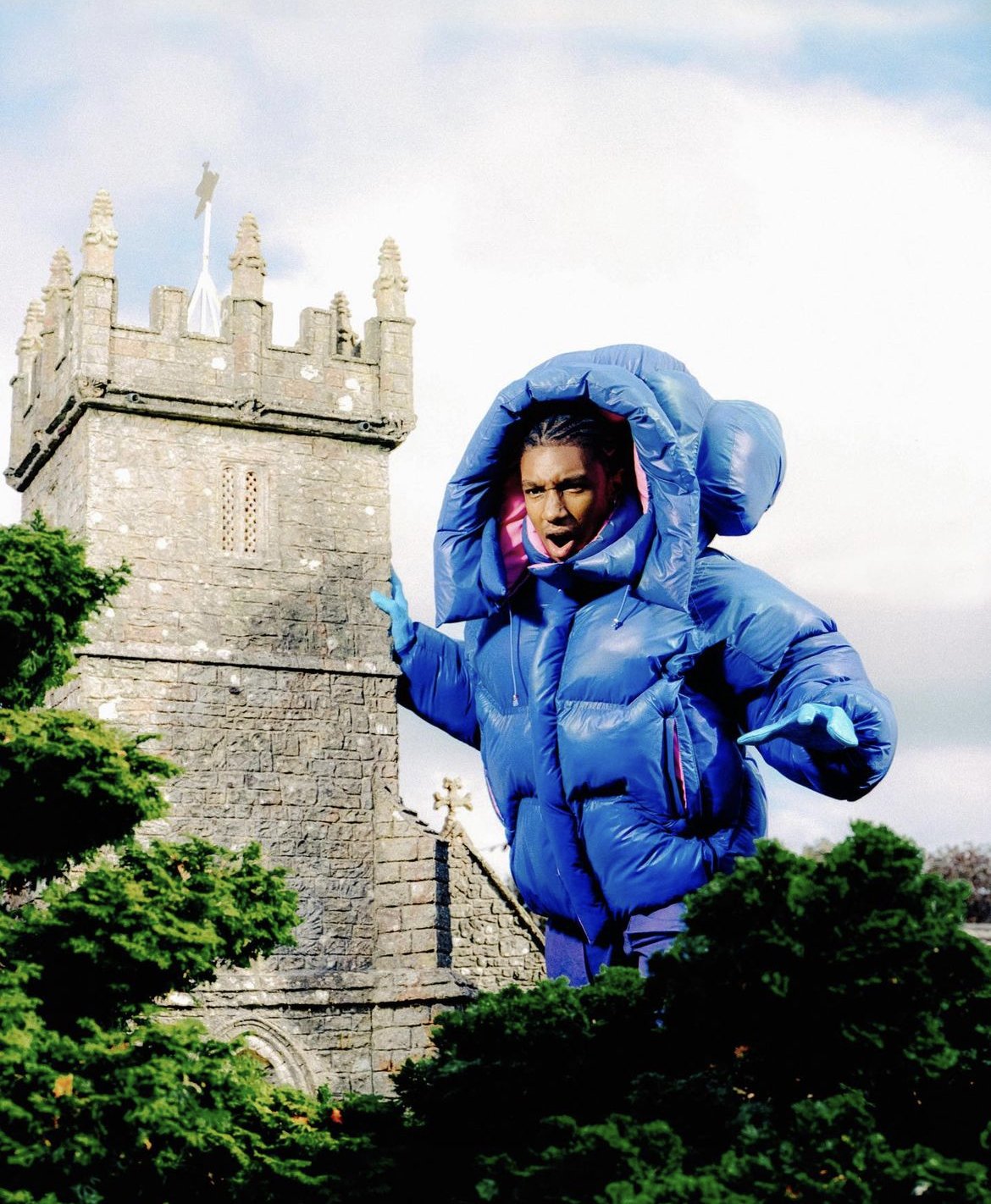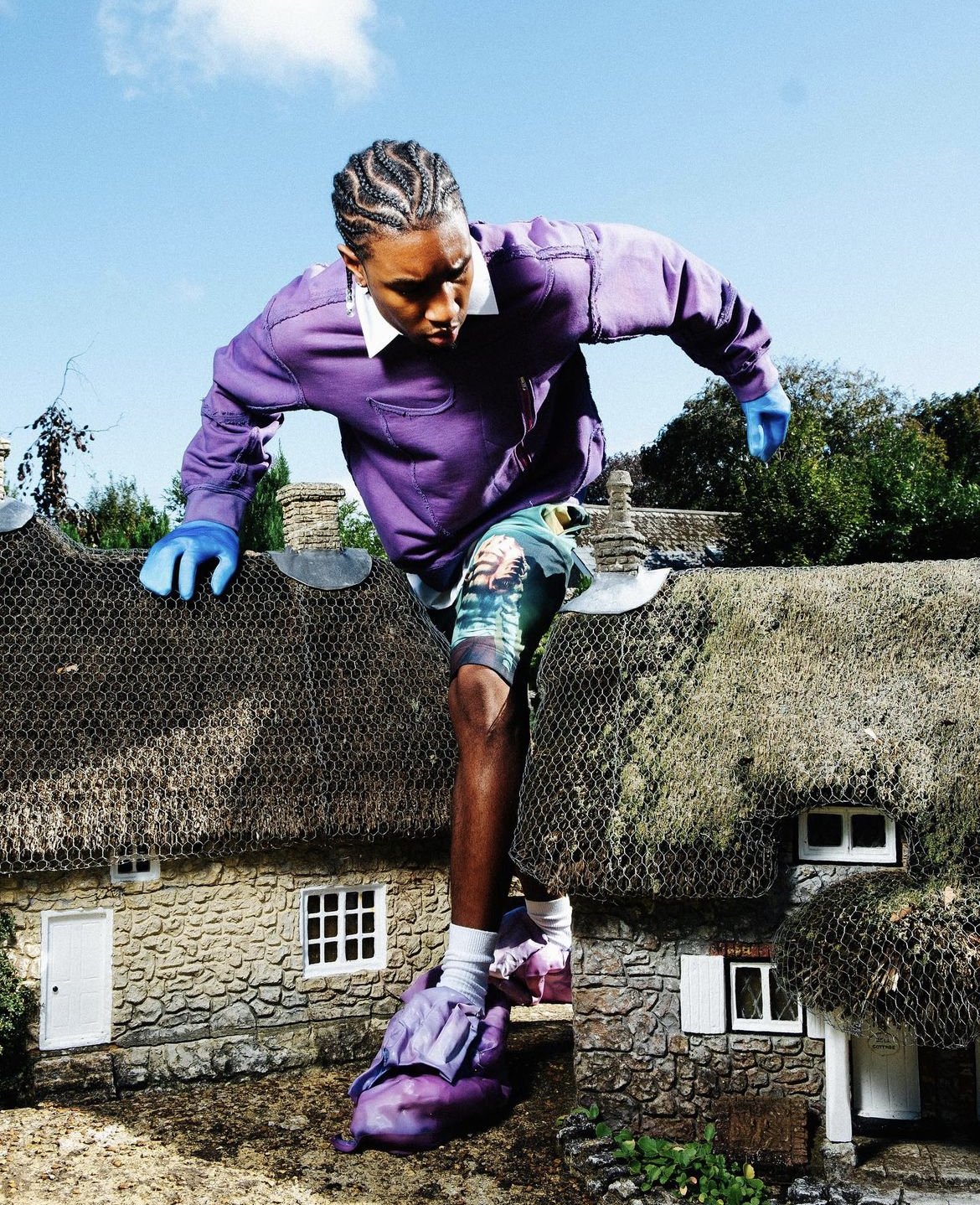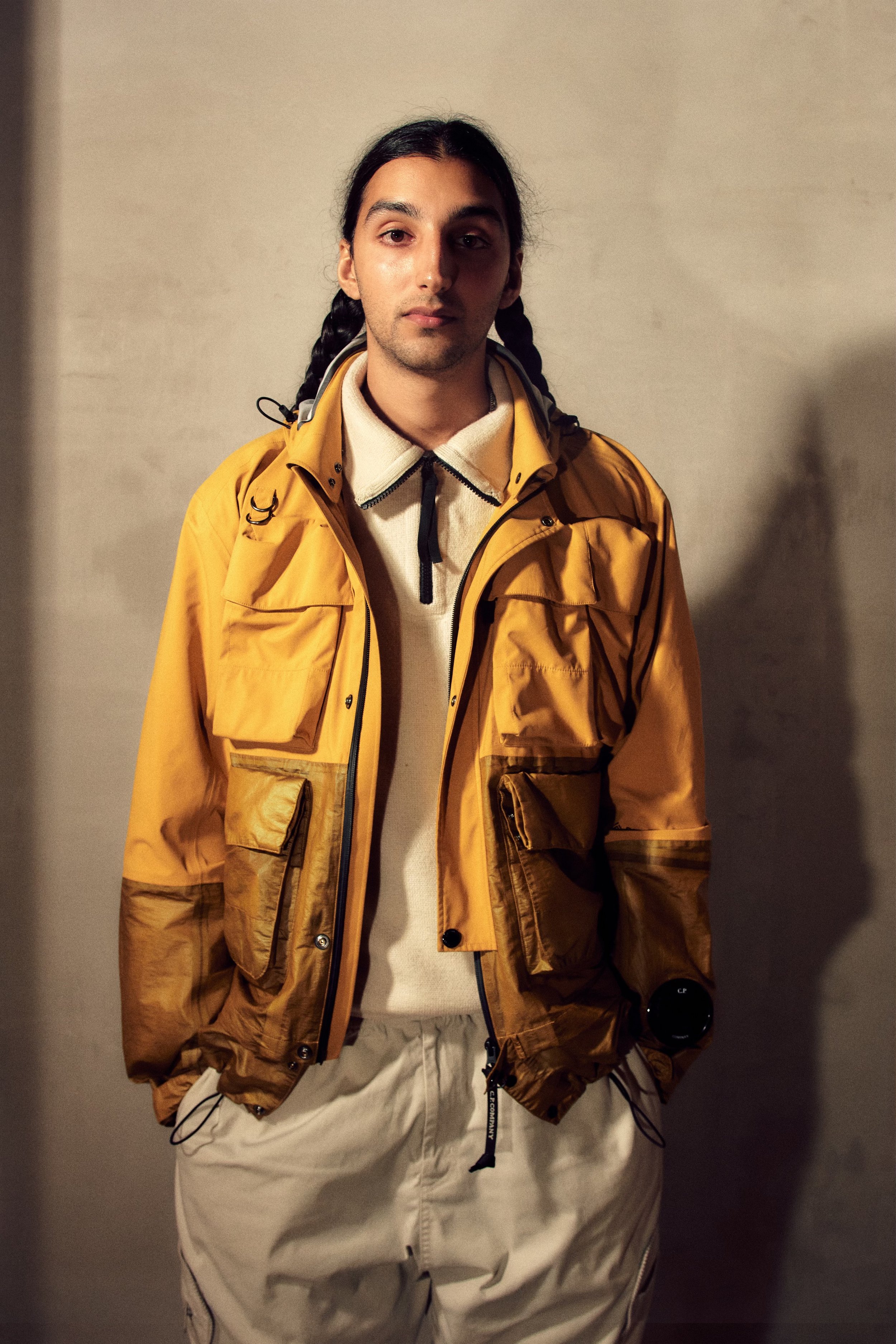Meet Yaku: the Emerging British Designer Blending Reality with Science Fiction.

Yaku Stapleton is soon to become a staple in your list of designers to watch. Particularly, if you’ve ever played the mediaeval fantasy game Runescape, watched Pokemon, Naruto: Shippuden, or Dragon Ball [which we are sure is now most of you reading]. Our writer Tashi met the Caribbean-British designer early last year whilst they were both completing their master’s at Central Saint Martins. In the vacuum of talent, that is the infamous MA design studio, Yaku could always be seen with a big smile and strangely shaped hat perched on his head [which was actually a repurposed hoodie from his uncle].
Since graduating, and joining the all-stars roster of alumni such as Lee McQueen, Yoshikazu Yamagata, Wales Bonner, to name a few, Yaku has continued to develop his work from his final collection. Chapter 1 of The ImPossible Family Reunion in RPG is now about to be Chapter 4 Looking Back to Look Forward to Look Back Again SS25. Not only chosen to be one of the few selected to show in London Fashion Week, Yaku was awarded the L’Oreal Creative Award, by the image director of Off-White, Ib Kamara. Having witnessed the stress and strain of creating the final collection it was a beautiful moment seeing his mum in the audience jump to her feet to applaud her son.
Born in the UK, in a town called St Albans, just outside of London, Yaku grew up in a large family. He is the middle child with siblings who have distinctive, yet relatable characteristics. There’s the “intimidating” older sister or the beloved younger brother who “lives life like Jesus”. These traits often find their way into Yaku’s clothes and they serve, not just as mere inspiration, but the foundation of his creations.
The path to becoming a designer wasn’t necessarily a clear cut one for Yaku. He first began studying geography, but during a one year gap between school and attending university he started making his own t-shirts. This began his journey in design, so that by the time he was studying geography at Leeds Beckett university, all of his free time was spent creating clothes, to the point where he inquired about a fashion marketing course. Already equipped with Photoshop, the tutor told him he would essentially be doing “nothing” for a year. Unsurprisingly this didn’t exactly appeal to Yaku, so he tried again, this time with the design course.
After convincing the tutor that despite having missed most of the first year, he would come in everyday to make up for it, he was in. Finally, he was in a place where he wasn’t just making clothes [which, ironically, they don’t do much of apparently in the first year] but learning to understand them. That meant exploring with blanks; preconstructed garments made from calico, a heavy-unbleached cotton. These blanks would be subjected to dyeing, deconstruction and so on by the first year students. Yet, just as they were coming to the point in their three year course where they would be learning more about construction…the pandemic hit. Away from the tutors and design studios with their expertise, machinery and textiles, Yaku focused on research and began to explore sensory design. He wanted to expand his designs and create work that stimulates the senses beyond just visual appeal and began reading scholars such as Merleau-Ponty and his concept ‘the phenomenology of perception’. This basis of research enabled Yaku to extend his design practises beyond fashion, to art. For his final collection he created textile and plasticine sculptures, furniture, an interactive game and of course his garments, which were hung around the space blurring the boundaries between art and fashion.
Before beginning his final year, Yaku interned with Menswear designer Aitor Throup who has collaborations with brands such as C. P. Company under his belt as well as holding a tenure as creative director of G-Star RAW until 2018. Sleeping on a friend’s sofa in Manchester, Yaku would take a coach every morning to get to Aitor’s studio in Burnley. His time with Aitor focused on precision and accuracy. He learnt invaluable skills and his time there enabled him to understand how he wants to run his own studio. After his final year exhibition in Leeds it was back down South, to begin his master’s at Central Saint Martins, and it was in his second year of the course where we crossed paths.
For Yaku “there’s no real lineal path of inspiration” but a starting point, for the sake of this article could be Afrofuturism. Having grown up watching Sun Ra’s Space is the Place [a masterclass in Afrofuturist narratives] and anime series such as Dragon Ball and Hunter x Hunter, Yaku already had one foot firmly in the science fiction realm. But it all came together when he discovered the African-American author Ytasha Womack, and her 2013 novel Afrofuturism: The World of Black Sci-Fi and Fantasy Culture.
Coined by writer Mark Dery in his essay Black to the Future [1994], he described Afrofuturism as an intersection of “imagination, technology, the future, and liberation”. Essentially the term has come to describe anything with an aesthetic that merges the histories of the African diaspora with futurist elements of science fiction and technology. It is far more than a mere aesthetic, however, it is a cultural program that serves to counter colonial histories, with decolonial futures. As American science-fiction author Octavia Butler states, in contemporary society there are humans who are categorised as ‘aliens’. Those who are alienated normally fall into the categories outside the narrow perimetres of being white, male, heterosexual and able-bodied. In Afrofuturism, in some instances, the alienated become actual aliens. For example, going back to the previously mentioned Space is the Place, in this film Sun Ra embodies an extraterrestrial being who creates a utopian society for Black people in outer space. By reimagining the alienation of Black people through hopeful futurist narratives, Afrofuturism is a tool for liberation through creation.
What particularly influenced Yaku was a quote from Womack’s book, “imagining oneself in the future creates agency” [2013: 9]. Building on this, he reimagines his family members and their specific characteristics in a world where these become their ‘superpowers’. The “intimidating” older sister evolved into a powerful female figure in an electric blue laminated scuba suit with angular sleeves and exaggerated shoulders. The younger brother “living life like Jesus” became a Jesus piece. A far cry from the jeweled pendant seen around the necks of hip-hop legends like B.I.G and Jay Z, instead Yaku’s was made from scraps found in the Central Saint Martins’ studio bins. In fact, much of Yaku’s looks were created from ‘waste’ material such as deadstock fabrics and donated clothes, all transformed by multiple processes of patchworking, dying, heat gunning and more. The efforts taken to give these fabrics an extended life is all in an attempt to reduce excess and waste and is informed by Yaku’s interests in circular design.
Since showing The ImPossible Family Reunion in RPG in London Fashion Week last year, what has changed for you?
I think the main thing that's changed is that the scale of everything has expanded, it's more serious and I mean I try not to be too serious, but I have to make more decisions and there is a lot more legal stuff I have to deal with as well. So there’s more actual decisions that have, um, results that could actually have an effect, whereas before I was just creating.
What does Afrofuturism mean to you?
I discovered Afrofuturism as a way for people to redefine and reimagine their own reality, to create alternate ones that affect how you see yourself in reality. I did it myself when I was younger and played this game Runescape where I created my own characters and could remove all limits of the real world.
Now you are older has your understanding of Afrofuturism shifted?
Somewhat, this last year actually I have had more time to think about it and something I found interesting was exploring my own background with scifi and how this connects to Afrofuturism. I grew up watching anime like Hunter x Hunter, Naruto, Cowboy Bebop and playing Pokémon, you know I have a load of Yu Gi Oh cards still. But I’ve been thinking about how this was kind of my gateway into Afrofuturism and how Black people have this strong connection with East Asian culture.
There is definitely a cross-cultural exchange between these two very different cultures.
Yeah, when we watch films we naturally attach ourselves to a character, but what’s strange for me is that so many people of colour find themselves attached to characters that are from the other side of the world. I think it’s because it’s easier to place yourself on something that is so far from your reality, like I didn’t grow up with many South-East Asians around me so for some reason I could see myself as a character like them more easily. I remember thinking I was Bruce Lee. I wanted to be him. There was no thought of “oh, this person is Asian, I’m not, so I can’t be him”. But in comparison I never thought I could be James Bond, he is a white character so he was never someone I could relate to or found much interest in.
You mentioned the anime you watched, how did they have an influence on you?
I mean you can carry out Afrofuturism in anime, even though the protagonists may not be Black, they are similar because they are also other. In the absence of Black protagonists and heroes, people created Afrofuturist work in scifi originally. But before this Black people needed someone to relate to and imagine themselves as. With a lack of these characters in Western media, anime was kind of the next best thing for us. It was so far removed, so different that you could place yourself in it. It was the best replacement for us and all the limits of Western media just don’t exist in anime. It’s only recently that we have some superheroes that do mad stuff, but anime has always been way ahead. The possibilities of their alternative futures were a much more interesting and better reality for me.
What are you working on currently and what can we look out for in the future?
So right now we’re working on Spring Summer 25, which we'll be bringing to Paris in June. And there’s always various collaborative projects that are going on. But I think the main focus right now is Spring Summer and I think that will build off of the essence of what we created for the Swedish Fashion Council’s Challenge The Fabric award that we just completed.
What would you like people to know about you to help them understand your clothes and connect with the brand?
Ohh, that would be that everything I do with the brand starts with my family. I think that’s a key way for people to get to know me and the brand. But I feel like that’s something that is my fault, because the way the clothes look it’s easy to get drawn into them just by appearance ‘cos there’s a lot going on, which is also cool and what fashion is about, but it would be cool if people knew that there’s the family side of things as well. I think knowing this would help people understand the decisions I make and my work better.
Yaku has just shown his Chapter 4 Looking Back to Look Forward to Look Back Again SS25 in Paris Fashion Week. Sabu looks forward to seeing more to come from Yaku and his world of nostalgia, sci-fi and always moving forward.
Text and Interview by Tashi Samuels
















